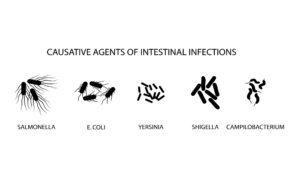Food Poisoning: Signs, Symptoms, and Prevention
Food poisoning is the result of an infection often caused by consuming foods containing harmful bacteria, such as parasites and viruses most commonly found in raw chicken, meat, eggs, and fish. According to the CDC, in the United States, “48 million people get sick from a foodborne illness, 128,000 are hospitalized, and 3,000 die,” each year. At this point, more than 250 foodborne diseases have been identified, the most common being Norovirus, Salmonella, Clostridium perfringens, Campylobacter, and Staphylococcus aureus.
Signs and Symptoms:
Some of the symptoms of food poisoning can include:
- Nausea
- Stomach cramps
- Vomiting
- Diarrhea
- Fever
Diarrhea can lead to dehydration. Some signs of dehydration include having a dry mouth, feeling lightheaded, and passing small amounts of dark colored urine.
How to Prevent Food Poisoning
If you’ve ever experienced food poisoning, you know it’s no joke. Although it’s absolutely miserable, it’s still common—but also preventable. Here are a few ways to avoid foodborne illness:
- The four steps to food safety:
- Clean: Washing your hands, cooking/prep surfaces, and cooking utensils often. Also rinse fresh fruits and vegetable under running water.
- Separate: Avoid cross-contamination by separating your raw meat, seafood, poultry, and their juices from other foods and use separate cutting boards and plates.
- Cook: Ensure that meats, eggs/egg dishes, and leftovers are cooked thoroughly to kill off any bacteria. Here is a chart for the safe cooking temperatures!
- Chill: Refrigerate your grub as soon as possible. Always keep your refrigerator’s temperature below 40˚F. Make sure to thaw frozen food in the fridge as well.
- Learn which foods are most commonly linked to foodborne illness such as raw meats or fruits and vegetables.
- Avoid raw (unpasteurized) milk and its products as it can present serious health hazards. According to the FDA, raw milk has not gone through the commonly practiced process of pasteurization which is performed by heating the milk to a certain temperature to kill off bacteria which may cause E. coli, Salmonella, Campylobacter, Listeria, and other diseases that cause foodborne illness.
When to see a Doctor
Most cases of foodborne illnesses will pass without any medical treatment, but you should seek immediate medical attention if you display symptoms such as:
- Severe abdominal pain
- High fever (temperature measured over 102˚F)
- Diarrhea lasting longer than 3 days
- Vomiting for more than one day
- Signs of severe dehydration (little to no urine, dry mouth and tongue, fast breathing and heartbeat, feeling dizzy or lightheaded, sunken eyes, and not feeling alert)
If you are suffering chronic gastrointestinal issues, Healthpointe is here to help. Schedule an appointment today to speak to a doctor.


